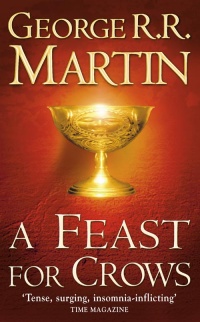BookBites:
A Feast for Crows
&
The Careful Use of Compliments

This is the one that seems to divide the fans.
There is little point in going over the story line here. If you have reached Book Four of A Song of Ice and Fire then you are an enthusiast. These aren’t books that you read in a week; there is some time to be invested with George R. R. Martin’s epic tale, to put it mildly. And anyway, if you want a recap there are two other articles on the grim world of Westeros elsewhere on this blog.
The main thing that seems to annoy readers of A Feast for Crows is that the chances are some of their favourite characters have gone AWOL. I confess when I heard that Tyrion didn’t make an appearance at all I wondered what the hell Martin was playing at. And no Jon Snow? No Bran? No Daenerys? It seemed perverse, to say the least. Martin, however, explains this to my satisfaction in his afterword; and quite honestly, he is the author so I’m happy to leave the decisions to him.
I believe that he was originally intending to have a five-year gap in chronology between A Storm of Swords and Feast. There has been a little sniping that he was unable to make it work; but in all honesty, how could he? Sure, you could have skipped Jaime for a few years and maybe return to him when he had gotten more proficient with a sword in his left hand, but how could you ignore that much time in the life of one of my favourite characters, Arya?
I think that I saw somewhere A Feast for Crows being called the Sex and the City volume; but come on, even New York women aren’t as tough as this lot. Leaving Asha, the sexy-scary Mellisandre and Daenerys the Mother of Dragons aside, they’re all here: Sansa, Arya, new girls Arianne and the Sand Snakes; and of course the Queen Bitch herself, Cersei Lannister.
God, this woman is bad; and by bad I mean rotten to the core. (Believe it or not, she’s toned down for the HBO show.) Sexual violence is never far away in Martin’s world, but hearing the Queen Regent hoping that another woman gets ‘a good raping’ is still pretty shocking. One thing that is a little surprising this time is that we realize that she isn’t half as smart as she thinks she is. From his eagle’s eye view in the Eyrie Littlefinger isn’t surprised at all—only at how swiftly she manages to isolate herself whilst running the kingdom into the ground.
Martin’s sex scenes are always ugly. If they don’t involve rape then they’re just plain weird, as with brother and sister having it away next to the corpse of their father. [In the new HBO season, it’s their dead son.) This time around Cersei even gets a short lesbian interlude, accompanied by this deathless prose:
“Her nipples were two black diamonds, her sex slick and steamy. The queen slid a finger into that Myrish swamp, then another, moving them in and out…” Good Lord! How is that for erotic imagery? My love’s vagina is like a Myrish swamp…
It’ll never find its way onto Valentine’s Day cards, you mark my words.
From Myrish Swamps to Beautiful Braavos…
Arya the born survivor continues to fascinate. She is central to another shocking episode which is all the more so for taking place off-stage. It also illustrates just how far her character has travelled, both internally and externally. Whilst I’m on this, her arrival in Braavos is a high point as we see this city for the first time. It really is one of those chapters that fires the imagination: quite breathtakingly lovely, as well as awe-inspiring.
Brienne the massive warrior woman continues to break this reader’s heart. There is just something so beautiful and touching about the woman and her Don Quixote-like tilting at the impossible. Because of her loyal nature there seems no task too outrageously difficult for her to take on.
I do wonder why I find these books so addictive. Usually when I embrace a fictional world there’s part of me that says in romantic naivety that I’d like to live there—Tarzan’s fantasy jungle, for example. I’d even be quite interested in a visit to Old Arkham; call me weird. Westeros, on the other hand has absolutely nothing at all to recommend it. There is next to no culture but shed loads of sadism; the music doesn’t appear to have changed in years; no one ever gets to takes a holiday because they’re either scheming (if they’re rich) or working their fingers to the bone (if they’re poor); and the inhabitants seem to have as a sole source of entertainment drinking gallons of wine and beer.
It looks like like a truly appalling place to live; but by heavens has it caught the public imagination!
I had put off watching Season 4 of the HBO series Game of Thrones until I got through with this one. Now, after seeing the first four episodes I feel I needn’t have bothered. The show and the books seem to be going off in their own directions, sometimes with entirely new scenes and interpretations of characters altogether. I suspect that if you want to see how this saga ends then it will be with the show. I don’t really believe (much as I want to) that Martin will ever now finish his protracted seven-volume tale in print.
One thing that I must say about A Feast for Crows is that I can’t think of a single case in sword-and-sorcery literature where the aftermath of a war between several kings has been portrayed so graphically. Although Martin has rarely concerned himself over much with the plight of the ‘smallfolk’ we see here that they are the ones who truly suffer when the highborn play their territorial Game of Thrones.
And the price that these poor folk pay is terrible indeed.
__________
…and from Braavos to Edinburgh.

Isabel Dalhousie makes a most unlikely link with savage Westeros, but as The Careful Use of Compliments begins she, like the Lannisters, is brooding on territorial imperatives:
“She looked at the room around her, at the desk, at her books. None of this would belong to her for ever; it would change hands and somebody new would be here, somebody who would not even know who she had been, somebody who would look at her with astonishment if she came back, in some thought experiment, and said: That’s my desk—I want it. Our possessing of our world is a temporary matter: we stamp our ownership upon our surrounding, give familiar names to the land about us, erect statues of ourselves, but all of this is swept away, so quickly, so easily. We think the word is ours for ever, but we are little more than squatters.”
OK, admittedly there’s a bit of a difference in scale there, but that’s my Isabel just the same: recognizable immediately. If she didn’t have something to worry her, she would have to invent it—and often does.
This is another fourth installment of a series, this one being on my favourite Edinburgh philosopher and editor of the Review of Applied Ethics. This time around she has interrupted her perfect life of the mind slightly by having a later-years baby in the form of Charlie. Still, it’s all good as she has her housekeeper Grace to look after him whilst Isabel exhausts herself by walking to her niece Cat’s delicatessen. And a word on Cat here.
Enough is enough: when is Isabel going to cop on to the hard fact that her niece is a spoiled-rotten, silver-spoon up her ass slapper with the morals of an alley cat. I thought that she was getting close at one point:
“She was shocked by the thought that her niece was—well, there was no other word for it—cheap. She knew that Cat had an eye for a certain sort of man—the wrong sort—and she knew that her boyfriends tended not to last very long, but she had not thought of her before as cheap. Or was there another word? Fast? No, a fast woman might not be cheap. They were two different things.”
Isabel, sweetheart, come ‘ere to me. I know that you’re much smarter than me, but stop tying yourself in knots. Your niece is a spiteful, envious, vindictful little tart who doesn’t deserve the love and forgiveness that you give her.
These books are the perfect antidote to a miserable stressed-out (don’t get me started), wearying bitch of a day. The author, Alexander McCall Smith, has such a light touch that you almost don’t notice how good a writer he is. This is particularly evident when Isabel and Jamie take a trip off the mainland to visit the Isle of Jura. This is where George Orwell wrote 1984 in splendid isolation; and surprisingly, as I visited the room with Isabel and Jamie where the masterpiece was composed, I actually felt a deeper understanding of it.
That is Smith’s quiet genius: his small tale meanders along, with not much happening, just as in life. Yet he gently prods you to acquire further knowledge. He cleverly mixes in real Edinburgh characters with the fictional ones, even in complete conversations; and I now find myself always keeping a notebook next to me as I read, because he will always introduce me to something or someone that I wish to know more about.
Some people may look down on these books as pointless fluff; but for me that is quite some achievement. And since The Careful Use of Compliments first appeared in 2007 I have many more to look forward to.
Lovely.

Recent Comments